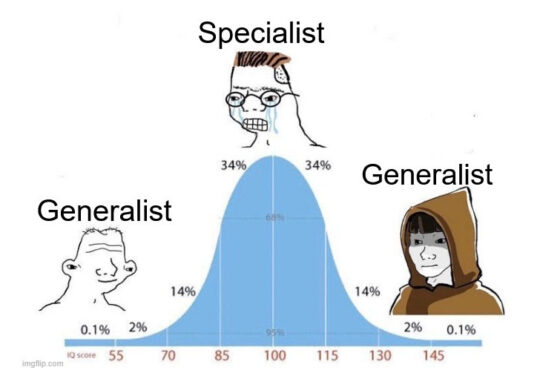
The Passion Problem: Why You’re Chasing The Wrong Thing
Why So Many People Get Passion Wrong
There was a time I believed I was meant to be a graphic artist.
I loved art. Aesthetics, colors, textures. I was all about it.
So I did what any responsible dreamer does: I pursued a career in graphic design.
Fast forward a few years, and I found myself dreading the very thing I thought I loved.
Not because the work was hard.
Not because I wasn’t good at it.
But because it turned out I didn’t actually like making art for other people.
I liked consuming art.
But the process? The deadlines? The repetitive nature?
That was a different story.
My wife had a similar experience with music.
She loved music deeply. Sang at church. A total band geek.
But when it came to making a life around performing music, she realized she hated the thing it required most: performing.
And more recently, my daughter wanted to go to college to study criminal forensics or psychology.
We sat down and looked at the costs.
They were high.
Then we looked at the odds of her actually getting a job in either field.
They were low.
So we asked a simple question: Do you know what the day-to-day looks like in those careers?
Would you actually like doing that kind of work?
She wasn’t sure.
But what she was sure of was that she liked doing nails. It made her feel focused and energized. So instead, she chose beauty school. Lower cost. Better odds. And she already knew she enjoyed the actual work.
That’s how it should work.
The Identity Trap
We live in a culture that encourages you to become something.
But it doesn’t help you figure out what you like doing every day.
So you chase identities instead of actions.
“I want to be a designer.”
“I want to be a psychologist.”
“I want to be a musician.”
But those are roles. Not realities.
If you don’t know what that person does every day—and if you don’t like doing those things—you’ll feel trapped.
Most people don’t fall out of love with their dreams.
They just never liked the process required to realize them.
Why Young People Struggle With Passion
Teenagers and young adults are encouraged to dream.
But they’re rarely asked to observe.
To shadow.
To test.
To reflect.
Instead, they’re told to follow their passion.
But what if that “passion” is just a projection based on status, not substance?
At that age, social standing matters more than anything else.
So kids often latch onto careers that sound impressive, or look impressive on TV or social media.
They don’t know what the work actually looks like.
And they’ve never tried it in the real world.
They love the state of being—not the state of doing.
This is how you end up with an entire generation of students going to college to pursue high-cost, low-certainty degrees in fields they’ve never actually experienced.
And when the fantasy crashes into reality, they’re left with debt and disillusionment.
College Is the Most Expensive Way to Discover You Picked the Wrong Path
We push kids to choose a career before they’ve tested their preferences.
College becomes a default next step, not a conscious investment.
But it’s not just expensive.
It’s risky.
Once you’ve spent $100K on a degree, it’s hard to walk away.
Even if the work makes you miserable.
Even if you realize you picked something for the wrong reasons.
The system is backwards.
We delay exposure until after the commitment.
We should be doing the opposite.
Expose first.
Test next.
Commit last.
Where Passion Actually Comes From
I used to think passions were formed entirely by doing meaningful work for people.
But that’s not quite right.
I now believe this:
Your passion is found in the interaction of your genetically determined core values and your community.
Your core values determine how your passion manifests generally.
Your community determines how it manifests specifically.
If your values lean toward exploration, you might become a scientist in one context, or a travel guide in another.
If your values lean toward helping others, you might end up in education, therapy, or customer service.
The expression of passion is shaped by the needs of the people around you.
When your skills meet those needs, you feel useful.
The Problem With Simulated Communities
In the past, people discovered their passion through participating in real communities.
You saw what your village or town needed.
You stepped into that need.
You learned by doing.
An organic feedback loop let you know what you should be doing.
But now, most people are shaped more by media than by community.
They scroll TikTok or binge Netflix.
They imagine themselves in roles that don’t exist in their physical world.
Or are oversaturated with applicants.
They chase passion in the digital realm, where feedback is shallow and needs are artificial.
And then they wonder why nothing sticks.
The feedback loop is broken.
The Alternative: Purpose Through Participation
Here’s a better model.
- Get clear on your core values.
- Join a real community that interests you.
- Observe what that community needs.
- Try solving a problem.
- Notice what energizes you.
- Iterate.
- Go deeper.
Instead of asking, “What do I want to be?” ask, “What problem am I equipped to solve—and for whom?”
Instead of obsessing over identity, get obsessed with contribution.
Instead being inspired by TV show, be inspired by the real world.
That’s where you’ll find a passion with value.
How to Discover Passion Without Destroying Your Finances
Most people don’t need to “find themselves.”
They need honest feedback from real-world experience.
And that doesn’t have to cost much.
Take a free internship.
Shadow someone in the field. Or even just talk to someone in the field.
Start a side project.
Do it for a month. Not a year.
You’ll know pretty quickly if you hate the daily tasks.
You’ll also know if something clicks.
When you find something that energizes you and helps others—pay attention.
It might not be your forever path.
But it’s a direction worth walking.
Key Principles
- Be crystal clear about your core values—and distinguish between:
- States of being (e.g., independence, status, power)
- States of doing (e.g., problem-solving, exploring, physical activity)
- Research careers or embed yourself in real communities to understand daily life Don’t trust job titles or media portrayals. Talk to people. Shadow them. Join communities. This helps replace fantasies with reality.
- Test iteratively, at low risk and low cost Try internships, side projects, volunteering, short-term gigs, or informational interviews. The lower the stakes, the more honest your feedback will be—and the less painful your pivots. After testing a job, don’t just ask “Did I like it?” Ask:
- What would make me stay in this path?
- What would make me leave?
- Ask: “Whose problem am I solving?” Passion emerges from serving real needs in a real community.
- Assume your passion is a moving target Passion evolves with context, competence, and community. Your values may remain stable, but your best-fit career will likely shift over time.
Key Takeaways
- Passion isn’t magic pixie dust. It’s born out of genetics and community.
- Most people fall in love with outcomes, not processes.
- College is too expensive to use as a discovery tool. Try cheaper experiments first.
- The more honest feedback you can get from real-world action, the faster you’ll align your work with who you really are.
Passion doesn’t live in your dreams.
It lives in what your community values.
Start small. Get in motion. Be useful.
The rest will take care of itself.
Thanks for reading my stuff,
MJ




